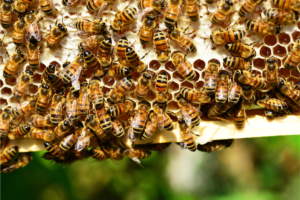When it comes to choosing a unique and fascinating pet, pigs might not be the first animals that come to mind. However, these intelligent and affectionate creatures have been gaining popularity as pets in recent years. If you’re considering adding a pig to your family, you’re likely wondering, “Which breed of pig is best as a pet?” This article aims to guide you through the decision-making process by providing an in-depth analysis of various pig breeds, their characteristics, and how they might fit into your life.
Exploring Different Pig Breeds
Not all pig breeds are created equal when it comes to being suitable pets. Here, we’ll analyze a few popular pig breeds, highlighting their characteristics and suitability for domestic life:
1. Miniature Pot-Bellied Pigs
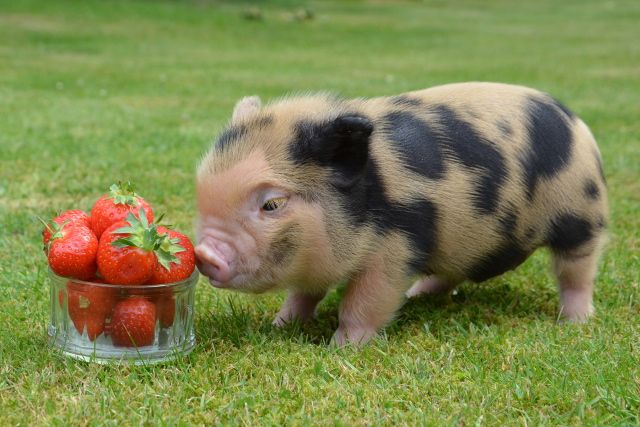
Miniature Pot-Bellied Pigs are perhaps the most recognizable pet pig breed. These small-sized pigs were initially bred in Vietnam and are known for their distinct pot-bellied appearance. They typically weigh between 100 to 150 pounds and stand around 16 inches tall. Their small size makes them well-suited for indoor living, but they still require adequate outdoor playtime.
Characteristics:
- Intelligent and trainable.
- Social and affectionate.
- Lifespan of 12 to 20 years.
- Prone to obesity, requiring a balanced diet and regular exercise.
2. Juliana Pigs
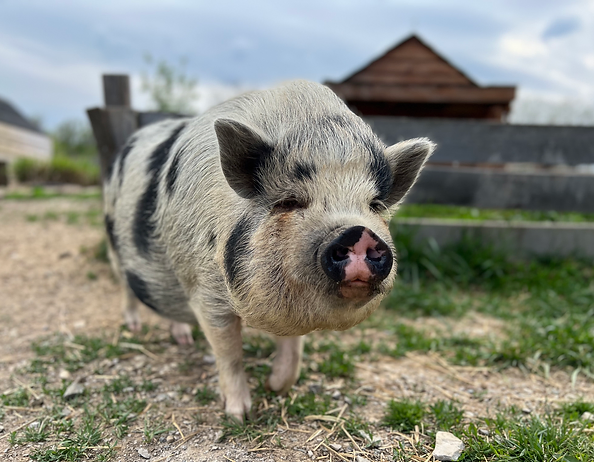
Juliana Pigs closely resemble Miniature Pot-Bellied Pigs, but they are a distinct breed. They are named after the Juliana region of Europe, where they were first discovered. Juliana Pigs are known for their striking coat patterns and smaller size compared to standard farm pigs.
Characteristics:
- Gentle and playful temperament.
- Highly trainable and receptive to learning commands.
- Lifespan of 12 to 18 years.
- Regular exercise is essential to prevent obesity.
3. Kune Kune Pigs
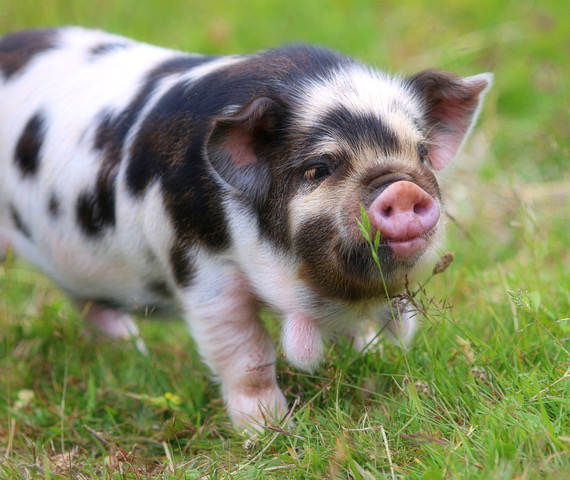
Originating from New Zealand, Kune Kune Pigs are characterized by their small stature, tasselled ears, and distinctive wattles (hanging skin under their chin). They are known for their friendly and sociable nature, making them great companions.
Characteristics:
- Friendly and docile temperament.
- Ideal for families with children due to their gentle nature.
- Lifespan of 10 to 15 years.
- They have a tendency to root in the ground, so providing rooting opportunities is important.
4. American Mini Pigs
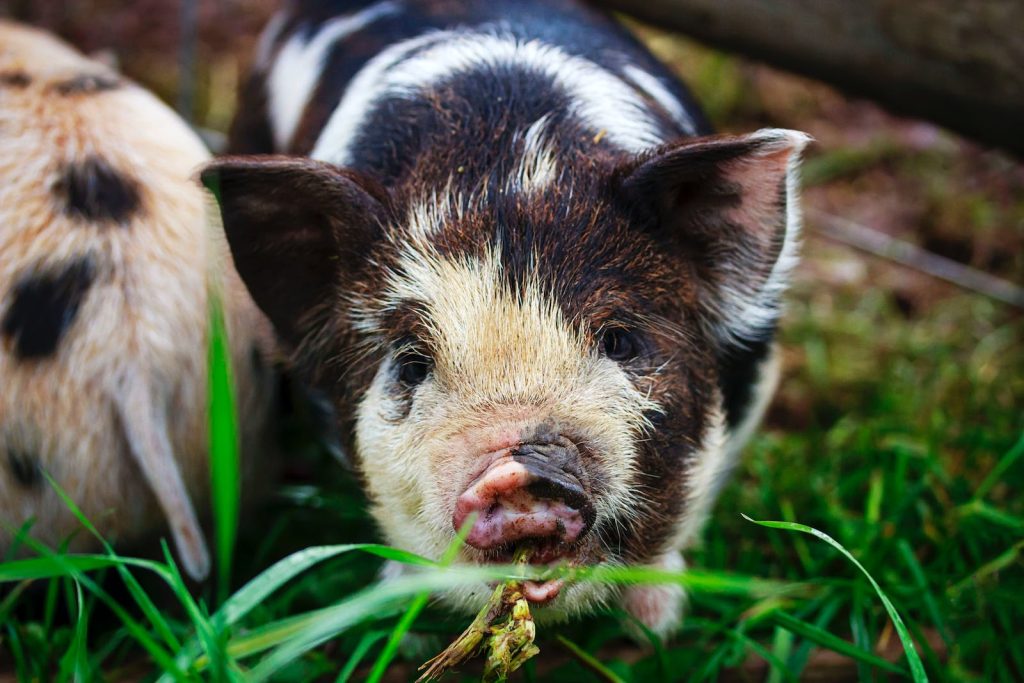
American Mini Pigs are bred to be smaller versions of traditional farm pigs. They are a relatively new breed and are gaining popularity as pets due to their manageable size and endearing personalities.
Characteristics:
- Clever and curious, enjoying mental stimulation.
- Affectionate and thrive on human interaction.
- Lifespan of 12 to 15 years.
- Regular exercise and a balanced diet are essential.
Benefits of having a pet pig
Pigs as pets? Absolutely! In fact, having a pig as a pet comes with a slew of benefits that make them appealing to a growing number of animal lovers. Let’s look into some of the advantages of having a pet pig:
- Intelligence and Trainability: Pigs are remarkably intelligent animals, often compared to dogs in terms of their ability to learn tricks and commands. They can be trained to perform a variety of tasks, making them engaging companions.
- Affectionate Companionship: Many pig breeds are known for their affectionate nature. They form strong bonds with their owners and often seek out cuddles and belly rubs.
- Clean and Odor-Controlled: Contrary to popular belief, pigs are naturally clean animals. With proper training and care, they can be litter trained and maintain good hygiene.
- Low Allergenic Potential: For individuals with allergies, pigs can be a suitable option as their hair is more similar to human hair and produces fewer allergens than traditional pets.
- Social Interaction: Pigs are social creatures that thrive on interaction. They enjoy being around people, making them great companions for those who are looking for constant interaction.
- Unique and Memorable Experiences: Owning a pig is sure to set you apart from the crowd. You’ll have plenty of stories to tell about your one-of-a-kind pet.
- Emotional Support: Pigs are known to provide emotional support to their owners. Their empathetic nature can be especially comforting in times of stress.
Problems with Pet Pigs
While pet pigs offer a multitude of benefits, it’s important to be aware of potential challenges that come with pig ownership:
- Size Mismatch: Some pig breeds might grow larger than expected, causing space and accommodation issues.
- Special Dietary Needs: Pigs have specific dietary requirements, and overfeeding or an improper diet can lead to obesity and health problems.
- Regulations and Zoning: Some areas have restrictions on pig ownership due to zoning regulations. It’s crucial to check local laws before bringing a pig home.
- Healthcare Costs: Pigs require veterinary care, and medical expenses can accumulate, especially if health issues arise.
- Long Lifespan: Committing to a pet pig means committing to a long-term relationship; they can live for well over a decade.
- Social Needs: Pigs are social animals and may become lonely or exhibit behavioral issues if not given enough interaction.
- Training Challenges: While intelligent, pigs can be stubborn, requiring consistent and patient training methods.
What do pet pigs eat?
When it comes to caring for a pet pig, providing a balanced and appropriate diet is essential for their overall health and well-being. Pigs, like any other animals, have specific dietary needs that must be met to ensure they thrive and lead a happy life. If you’re considering adding a pig to your family, understanding what pet pigs eat is crucial. Let’s delve into the dietary requirements of these intelligent and charming animals.
1. A Mix of Commercial Feed
Commercial pig feeds designed for mini pigs or pot-bellied pigs can serve as the foundation of your pet pig’s diet. These feeds are formulated to meet the nutritional needs of pigs, providing them with essential vitamins, minerals, and nutrients. When selecting a commercial feed, opt for high-quality options that contain a balanced mix of protein, fiber, and other key nutrients.
2. Fresh Fruits and Vegetables
In addition to commercial feed, fresh fruits and vegetables should make up a significant portion of your pig’s diet. Pigs are omnivores, which means they enjoy a diverse range of foods. Some suitable options include:
- Leafy Greens: Spinach, kale, lettuce, and Swiss chard are excellent choices that provide essential vitamins and minerals.
- Root Vegetables: Carrots, sweet potatoes, and beets can be cooked and offered in moderation.
- Fruits: Apples, pears, watermelon, and berries are enjoyed by pigs, but remember to remove any seeds or pits.
- Other Vegetables: Broccoli, bell peppers, and zucchini are nutritious choices.
3. Limited Grains
While grains can be a part of a pig’s diet, they should be offered in moderation. Too many grains can lead to obesity and other health issues. If you choose to include grains, opt for whole grains like oats or barley.
4. Protein Sources
Pigs require protein for growth and muscle development. Suitable protein sources include:
- Lean Meats: Cooked lean meats such as chicken or turkey can be given in small amounts.
- Legumes: Cooked lentils, beans, and peas are good plant-based protein sources.
5. Dairy Products (Optional)
Some pig owners offer dairy products like yogurt or cottage cheese as occasional treats. However, be mindful of lactose intolerance, as some pigs may not tolerate dairy well.
6. Avoid Processed and High-Sugar Foods
It’s important to steer clear of processed foods, sugary treats, and foods high in salt. These can lead to health issues and obesity in pet pigs.
7. Fresh Water
Always provide your pig with access to fresh, clean water. Hydration is crucial for their overall health.
8. Portion Control
Portion control is key to preventing overfeeding and maintaining a healthy weight for your pet pig. Obesity is a common issue among pet pigs and can lead to various health problems.
9. Consult a Veterinarian
Every pig is unique, and their dietary needs may vary based on factors such as breed, age, and activity level. It’s advisable to consult a veterinarian who is knowledgeable about pig care to create a personalized feeding plan for your pet.
10. Monitor Your Pig’s Health
Keep a close eye on your pig’s weight, body condition, and overall health. If you notice any changes in appetite, weight, or behavior, consult a veterinarian promptly.
Feeding your pet pig a well-balanced diet is a fundamental aspect of responsible pig ownership. By providing a mix of commercial feed, fresh fruits and vegetables, limited grains, and appropriate protein sources, you can ensure that your pig receives the nutrition it needs to thrive.
The bottom line
Deciding which breed of pig is best as a pet requires careful consideration of your lifestyle, living situation, and commitment level. Each breed comes with its own set of characteristics and needs, so take the time to research and interact with different breeds before making a decision. Remember that owning a pet pig is a long-term commitment that requires dedication and responsible care. With the right breed and proper care, a pet pig can become a beloved and unique member of your family, bringing joy, companionship, and a dash of individuality to your life.
